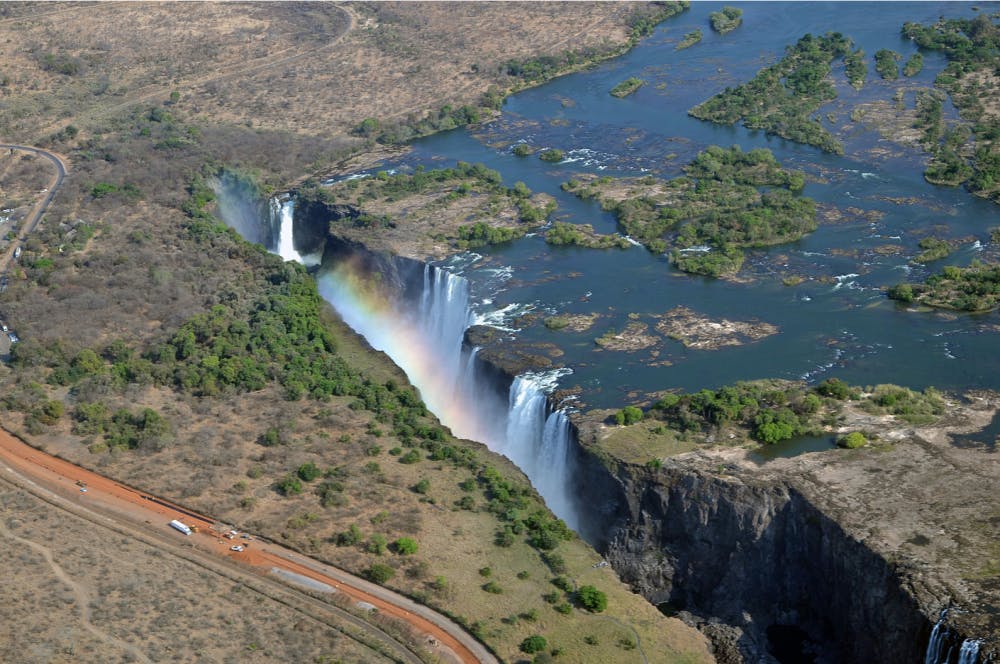By: Archer K Hill II
This summer semester a group of Miami University undergraduate and graduate students will embark upon the adventure of a lifetime. From May 31 to June 23 the Institute for the Environment and Sustainability (IES), led by Dr. Jonathan Levy, is running its annual study abroad trip to Zambia. Students will be based just outside the capital of Lusaka, but will have opportunities to travel throughout the geographically diverse nation for study and exploration—including a trip to the natural wonder of Victoria Falls.Zambia—a landlocked, south-central African country and former British colonial possession—is, relatively speaking, one of the more peaceful and stable countries in sub-Saharan Africa. In fact, it’s one of the few countries in the region that has never been to war since its independence in 1964. It is also the largest producer of copper in Africa, and exports this essential commodity around the globe. Despite this, Zambia experiences significant economic strife and inequality that is very closely related to its history, and more specifically to its reliance on copper mining as a primary export and mode of production.Over the course of the program, students will partake in a number of different environmental and social research areas—in particular, they will focus on issues directly related to the availability and quality of water supply that are all-too-familiar in many underdeveloped countries. They will also be taking soil and air samples, which are useful to get an idea of the state of the environment in various regions of the country, especially as it relates to the effects of extensive mining.Sarah Wayman, an IES master’s student with a background in geology, is one of those who will make the journey to Zambia for this study abroad adventure. She agreed to answer a few questions about the research she will carry out and her expectations for the trip.Tell me a bit about the Zambia trip: what it is, who’s going, what is/are the objective(s)?The trip is taking place this summer for about three weeks. People going on the trip are a mix of undergraduate and graduate Miami University students. When we are in Zambia we are going to partake in a number of different activities. These include water sampling, soil sampling, air sampling and conducting interviews with locals. What sort of research will the group be doing? What will your focus be?We will be using different research techniques. In the past, Kabwe, Zambia was home to mining activity. Due to the mining, the town was exposed to contamination. We will be sampling different media and seeing how it has been impacted by the mine. I will be focusing on air and soil sampling. We will be setting up a few PurpleAir sensors. This will allow us to understand their air quality. I will also be taking soil samples to analyze the presence of different metals in the soil. What inspired you to want to partake?I have always been interested in traveling. Whenever I am offered a chance to experience a part of the world, I take it. I am also excited about the opportunity to contribute to research intended to better understand contamination levels, why this is the case and how it can be remediated. Is this your first study abroad/international experience? If not, where else have you been?I studied abroad in Bhutan during my undergraduate. Bhutan is a very small country (less than the population of Columbus, Ohio). I enjoyed getting to see and experience a new culture. I stayed in Bumthang, Bhutan. During my stay I was put outside of my comfort zone because Bumthang is very rural, and most days we did not have hot water or electricity. I learned to embrace new experiences that are different than what I am used to. What are you hoping to take away from this experience?I am hoping to learn new things about Zambia and maybe what a typical day would be like for someone that lives in Zambia. I am also hoping to experience their culture. Will you be collaborating with local Zambians?Yes, we will be working with scientists and researchers. I am hoping to gain insight and expertise about different topics such as lead contamination, sampling and general knowledge about Zambia. We will also be working with the local population. I hope to gain knowledge about their lives and what it is like to live there. Are you ready for the culture shock? What sort of things have you done to prepare?I feel that I am ready for potential culture shock. I am in a class with Dr. Levy where we discuss life in Zambia and what we will be doing. In this class we have had a number of guest lecturers and we have watched documentaries to give us an idea of what we might be experiencing. A good amount of people in that class will be going as well. I feel that experiencing new cultures with fellow students helps to adjust to the new experiences and culture shock.Photo via Wikimedia Commons

